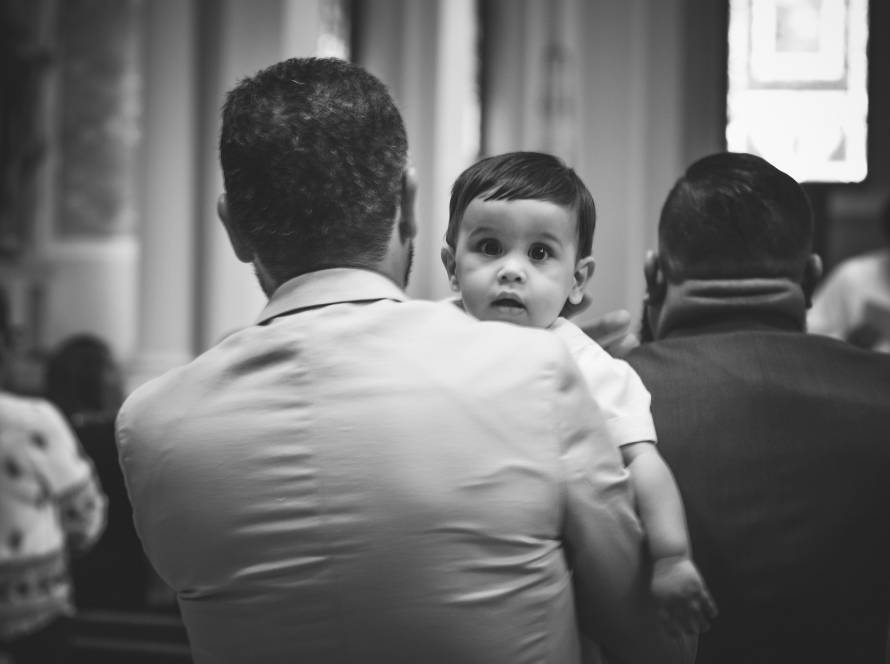It seems like whenever the topic of intergenerational or multigenerational worship gets brought up, a lot of concerns and assumptions start being expressed. Recently, someone directed some comments towards me that included many of those assumptions such as, “Intergenerational worship doesn’t meet the developmental needs of children and/or adults” and “Kids need to have their own space” and “We can’t dumb down the service just so kids can be there.”
Each of these concerns is fraught with a backdrop of suppositions and presumptions about what it could mean to have all ages gather for a time of corporate worship. And rather than address each of these individually, I thought I’d share some thoughts regarding what intergenerational worship is not and what intergenerational worship is.
Intergenerational Worship is NOT…
Putting kids in the sanctuary
If the goal was just to put children and youth in the sanctuary, then creating a new service geared to them and separate from the rest of the body would make sense. But that’s exactly the opposite of what intergenerational worship is. The whole point is to create space for all generations, old and young and in-between, to worship together.
Creating a new service or maintaining an existing service that targets one specific generation can’t accomplish this goal. It’s not just about putting seats in the seats; it’s about engaging the entire body of Christ in the work of the people (liturgy) or, in other words, the corporate community worshiping God together.
Glorified Kid’s Church
Some people express the concern that if children and youth are welcomed into the service, they’d have to start doing “kids stuff” like singing songs with motions and eating goldfish during the super-short, kid-appropriate sermon.
Intergenerational worship is not old people pretending to be kids or young people trying to act old.
If that happened, it would be a total disservice to the whole point of intergenerational worship which has at its heart a desire to help kids and youth and adults and elderly be a part of the church as it is, whatever that looks like, and to experience all the parts of church that make it unique to their church tradition (such as liturgy, songs, Scripture reading, celebratory practices like baptism and communion, and all the other rhythms that make each worship service unique).
Developmentally Inappropriate
I’ve actually written entire blog posts on this topic, so I won’t go in depth here but let me just share this: Development not just about what children can understand in terms of words and concepts; it’s about what they can learn socially, emotionally and in our case, spiritually.
Many developmental theories and constructs encourage children and adults to learn, play, and yes, worship, together. For example, Vygotsky’s Zone of Proximal Development explains that young children need to be in close proximity to older people who have “mastered” the tasks that they are learning. Fowler’s theory of Faith Development tells us that children will build their first ideas about their faith from the impressions of what they see and hear in church.
The truth is if we look at the broad spectrum of developmental theories including these and others not mentioned here like Erikson’s stages of psychosocial development or Kohlberg’s stages of moral development, we can find space in all of them for including all ages in contexts of intergenerational worship and ministry.
A Disruption
Often a concern raised is that children especially don’t get anything out of church and everyone will be forced to spend their whole service shushing kids. I read an incredible article in The Federalist, of all places, about this, and I’ve had a lot of conversations with parents, caregivers and other congregation members about this concern.
 I’m not about to say that children will get the same thing out of church that adults do; that would be ridiculous. I do think it’s important to consider what kids do get out of church (for more on that, click here) but also just as important to realize that kids are kids. They will wiggle and squirm and giggle and turn, but is that really such a huge issue that we shouldn’t offer times for the whole congregation to worship together?
I’m not about to say that children will get the same thing out of church that adults do; that would be ridiculous. I do think it’s important to consider what kids do get out of church (for more on that, click here) but also just as important to realize that kids are kids. They will wiggle and squirm and giggle and turn, but is that really such a huge issue that we shouldn’t offer times for the whole congregation to worship together?
It didn’t seem to be an issue for Jesus when He “called a little child to him, and placed the child among them. And he said: ‘Truly I tell you, unless you change and become like little children, you will never enter the kingdom of heaven. Therefore, whoever takes the lowly position of this child is the greatest in the kingdom of heaven. And whoever welcomes one such child in my name welcomes me.’”
A New Fad
Actually, it’s exactly the opposite. The segregation of ages within the church is a fairly new practice in American church history. Most of the time it gets traced back to the start of ministries on college campuses on post WWII America where it became apparent that there was a need for age-specific ministry. Churches began to recognize the need to create space to address the developmental concerns of each age group. Through time that progressed into less of a “both/and” model and more of an “either/or” model. In other words, instead of times of both age-specific and intergenerational gatherings, it became one or the other with little to no opportunity or encouragement to do both.
For those who see intergenerational worship as the “newest” fad to come down the block, it is helpful to understand that for thousands of years, the church all worshiped together and only recently have we begun consistently separating the ages, which makes it very hard to learn from one another as Christ indicated that we should.
So, what is Intergenerational Worship?
Simply put, it is ministry that focuses on connecting multiple generations in faith-forming relationships cultivated through times of corporate worship, intentional discipleship, and ongoing mentorship.
It’s much more than a Sunday morning experience or simply worshiping in a specific location. It has at its heart a focus on generational discipleship and experiencing of our faith together as a community. And, it can have its challenges, especially today where age segregation (keeping the generations apart both physically and culturally) is the norm. Let’s just be honest, age integration (putting generations together) can be difficult.
However, research has shown that it is not only a good and healthy thing for different generations to spend time in relationships one another, it is also one of the key factors in young people remaining in the faith after they’ve left their home of origin. And there are things we can do to help make our times of corporate worship beneficial to all.(For more on this, click here)
And, one more thing real quick..
For clarification purposes, please know that I am not opposed to quality Christ-centered, community-focused Children’s Ministry and Youth Ministry, but I do have concerns when families and churches are consistently separated from each other and never having time to fellowship together.
There is great benefit to all of us when we are given the chance to learn from, worship with, and grow together with one another.
It’s in our spiritual DNA; we were built for community by our very Creator God who exists in the perfect community of the Trinity and in whose image we are created. When Christ called the Church, he didn’t differentiate by age. He simply called to all who believed in Him to follow Him together. We need each other, every age, every level of development, every part, in order for us to truly be “the body of Christ.”
For more information about
- Kids in Worship
- Determining which Type of Family Ministry model works best for your church
- Discipleship in Intergenerational community
- Encouraging the continued conversation through Practical Discipleship at Home
- Seminars, Workshops, Coaching
Check out to ReFocus Ministry or “like” our Facebook page. Join our conversation at theReFocus Family and Intergen Ministry group on Facebook.
About this Blog

Refocus Ministry was started by Christina Embree, wife to Pastor Luke, mom to three wonderful kids, and church planter at Plowshares BIC. With years of experience in family ministry and children’s ministry, she is passionate about seeing churches partnering with families to encourage faith formation at home and equipping parents to disciple their kids in the faith. She recently graduated with a Masters of Arts in Ministry focusing on Family, Youth and Children’s Ministry at Wesley Seminary, she also blogs at www.refocusministry.org and is a contributing blogger at D6 Family, ChurchLeaders.com, and Seedbed
*The advertisements on this page are chosen by WordPress, not by ReFocus Ministry and do not necessarily reflect the opinions and values of the author.


